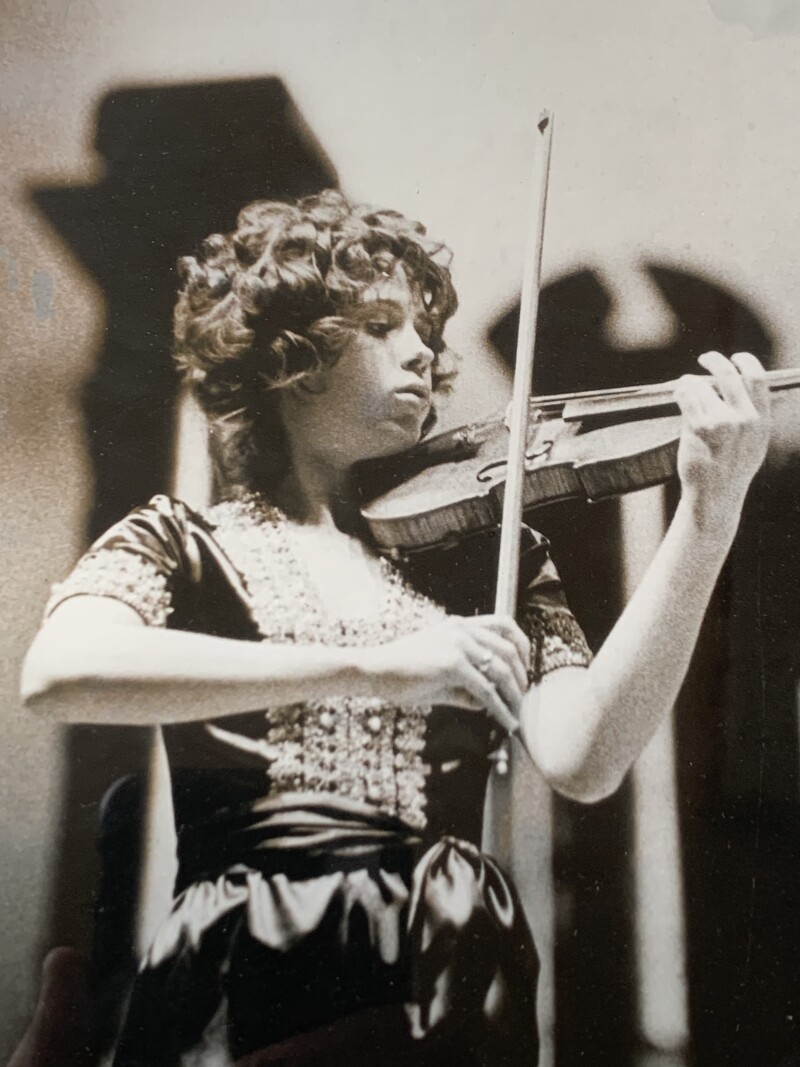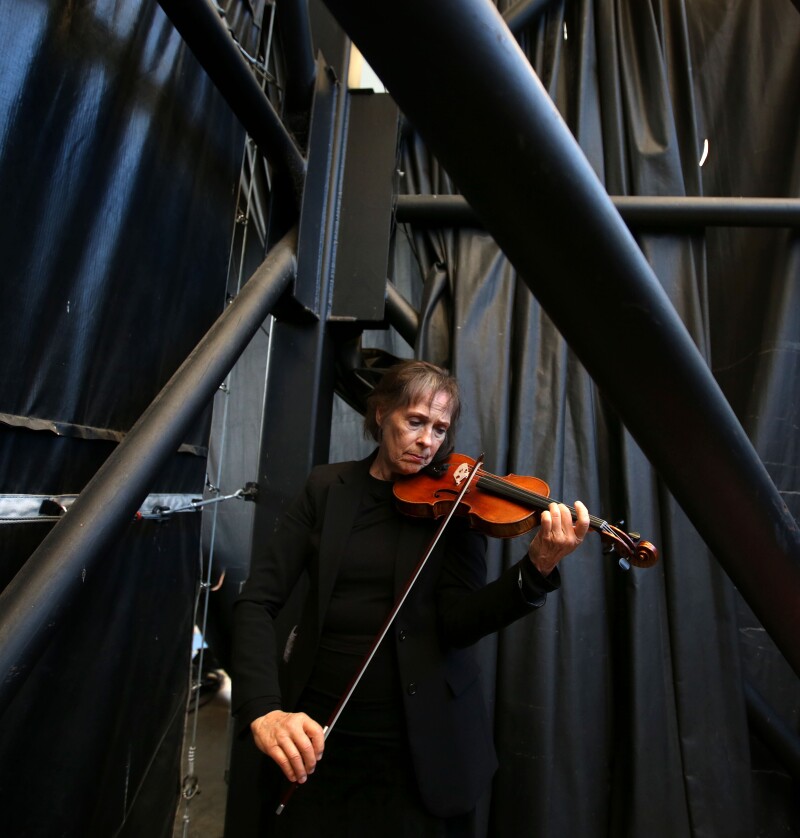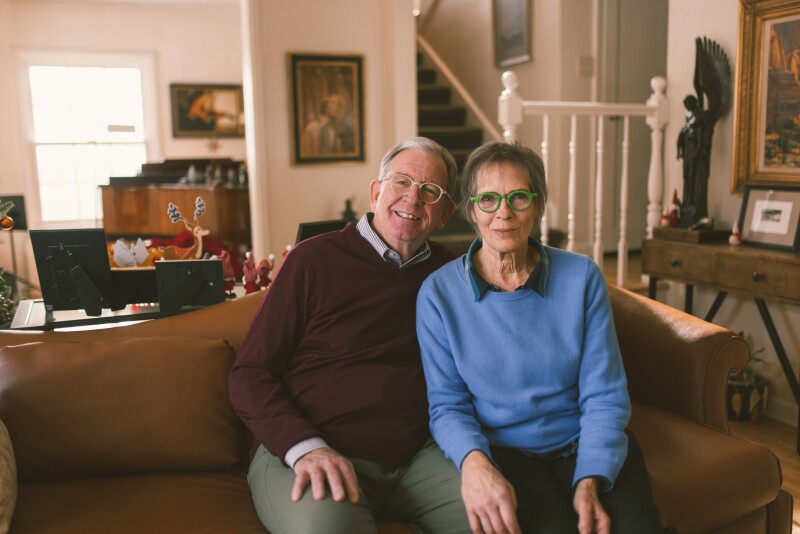Violinist Meredith Campbell can’t name all the famous musicians she’s accompanied in orchestras over the years, but she can list a few.
There’s 28-time Grammy Award winner Quincy Jones, singer-songwriter Smokey Robinson, Barry Manilow, and the Three Tenors. Then there’s Hugh Jackman, Andrea Bocelli, Josh Groban, Michael Bublé, Sarah Brightman, Richard Elliot, and the Trans-Siberian Orchestra.
But that’s just the beginning—as a soloist, Meredith has performed in Jerusalem, China, and the Caribbean. She knows her way around a recording studio, too, and was once even hired to create “wretched” violin sound effects for a warrior woman in a PlayStation video game.
A classically trained musician, Meredith has also bowed with the Utah Symphony and the Delaware Symphony Orchestra. But for the past two decades, her reach as a musician has been even more expansive in her role as concertmaster, or lead violinist, of the Orchestra at Temple Square.
On or off the stage, the violin is more to Meredith than an instrument of carefully crafted wood and strings. It is part of her very being, and the music she draws from it is an expression of the deepest parts of her soul—even her testimony. She gives this music freely because it is, in many ways, her life’s calling.
And so, day after day, Meredith reaches for her violin. Settling the instrument on her collarbone, she secures it with her chin, lifts her bow, and releases the song from within.

The Girl and Her Instrument
Although Meredith and her instrument are nearly inseparable today, it wasn’t exactly love at first sight when she met the violin. As a four-year-old she started learning the piano, but it was practically impossible to find practice time—her mother taught up to 50 piano lessons a week in their home, and the piano was rarely available. So when Meredith was eight years old, she began taking violin lessons from her aunt.
“I think I cried the varnish off my first violin begging to quit because it sounded so horrible,” Meredith recalls. But her parents didn’t let her give up, so she kept on practicing.

As she refined the notes that came from her instrument, Meredith was exposed to great music within the walls of her home.
She would lie in bed at night listening to her mother, a Juilliard-trained pianist, play Mozart, Beethoven, Schumann, and Brahms. Her dad was a clarinetist who taught elementary school orchestras, and Meredith fondly remembers him playing in a band in Salt Lake City’s Liberty Park for patriotic events.
As a girl, Meredith listened to her inspirations when they came to town: Isaac Stern, whom the New York Times called one of the great instrumentalists of the 20th century, and violin virtuoso Itzhak Perlman. On Saturday mornings she’d take a bus to attend free children’s concerts by the Utah Symphony, and during her teenage years, she attended music camps all over the country, from California to Colorado to North Carolina.
So it’s little wonder that by high school, Meredith’s relationship with the violin had changed; where the young musician had once lamented over the “horrible” sounds of her earliest practices, her trusted bow and strings were now life itself. “This is just me,” she remembers thinking, and as she looked toward her future she knew that music was going to play a major part in it.
To Play or Not to Play
After studying violin at the University of Utah for a short time, Meredith studied in London and then auditioned for the highly competitive Utah Symphony—and got in. During these years, she also met and married her husband, Clark Campbell. As they started having children, the couple wondered whether Meredith should stay home full time or if she should continue playing professionally.
Meredith knew there would be long-term consequences if she put her violin on the shelf. “You can’t put the violin away for 10 years and then come back and think you’re ever going to retrieve what was there before,” Meredith says. “It just is impossible—it’s an ongoing, continuous, lifelong process of playing [and] keeping up your skills.”

So she and her husband decided to take the matter to the Lord, and they found their answer: “Along with being a mother, I was to continue ... playing the violin,” she says.
But it wouldn’t have been possible without the support of her husband of 50 years, she says. In fact, Clark even helped her find more opportunities to play. Meredith recalls one occasion in particular when Clark surprised her with some news after their family had just moved to Delaware and their second child was a newborn.
“I [had] a six-week-old baby, and [I was] nursing, and he said, ‘OK, I have an audition for you for the Delaware Symphony in two weeks.’ … [I] went, ‘Yikes!’” she says, laughing. But she went to the audition and was not only selected but became associate concertmaster of the Delaware Symphony. “He’s been wonderfully supportive, always, throughout our lives. … So I can’t ever say that I accomplished this on my own because that’s really not true. I had the wonderful support of my husband.”
The Original Orchestra
The Campbells moved back to Utah in 1979 and Meredith quickly became a part of the local arts community; the following year she performed in a volunteer orchestra in honor of the sesquicentennial of the founding of the Church, and in the late 1980s she bowed once more with the Utah Symphony, traveling with the group to Eastern Europe. She was also a member of the committee that selected hymns for the 1985 hymnbook of The Church of Jesus Christ of Latter-day Saints.
▶You may also like: Did you know ‘Called to Serve’ was the last song added to the 1985 hymnbook? Here’s how it made it in
During these years, Meredith and Clark had four more children. At church, the busy mother and musician enjoyed her calling as a Primary chorister. Then, in August 1999, she got wind of a new ensemble the Church was establishing under the direction of President Gordon B. Hinckley: the Orchestra at Temple Square. She auditioned and was notified by mail that she had been accepted. Former Tabernacle Choir music director Craig Jessop recalls how Meredith stood out among the rest.
“We were incredibly impressed by her great musicality, her spirituality, [and] her obvious devotion and commitment to the mission of the Orchestra at Temple Square,” he says, noting that her tone, phrasing, nuance, and style all made an impression. “Her superb leadership and ability [were] evident from the very beginning, so there was no question that she [should be] brought in.”
The Orchestra at Temple Square, Meredith says, was a small operation at first and performed only a handful of times a year. But gradually it started developing a reputation, and in 2002, members played in Salt Lake City’s Winter Olympic Games with Grammy Award-winning clarinetist Richard Stoltzman and opera singer Frederica von Stade.
Since 2003, Meredith has been concertmaster of the Orchestra. Audiences may recognize a concertmaster as the first-chair violinist who leads the orchestra in tuning before a concert. But Jessop explains that the role of concertmaster is much more than that.
“There are times when the concertmaster is leading every bit as much as the conductor, sometimes in certain passages maybe even more,” he says. “So there’s a real partnership between a concertmaster and a conductor. There has to be a real trust and an understanding and respect for the different roles they play.”
During a concert, Jessop says, the other string players look to Meredith to see what she’s doing and how she’s doing it.
“A concertmaster has to lead. The entire string section follows her, but [she] also [has] to blend and fit with the ensemble as well. It’s a unique role, and a conductor relies so heavily upon the concertmaster for the ensemble of the orchestra, particularly the string section of the orchestra. And she’s a fabulous leader, a fabulous concertmaster.”

Meredith’s other responsibilities as concertmaster of the Orchestra include helping Mack Wilberg, current music director of The Tabernacle Choir, and Ryan Murphy, associate music director of The Tabernacle Choir. “A great privilege of my musical life is performing with Mack Wilberg and Ryan Murphy,” she says. Meredith also collaborates with the conductors and writes the bowings— music markings that help string players know when to use certain techniques with their bows—for the songs the Orchestra performs.
Because playing in the Orchestra at Temple Square is a church calling, Meredith isn’t paid for her efforts. But for her it isn’t about the money; it’s about the music. For instance, her husband recalls that when the Orchestra played Handel’s Messiah in the past, Meredith enlisted the help of a violinist who she felt was better skilled at baroque music. She then asked him to sit in her first chair while she took a place in the back.
“I don’t know anybody in all of my associations … who has the kind of confidence she has to do what she does, yet at the same time the humility to step aside,” says Clark. “She does not need the limelight.”
A Blessing Fulfilled
While Meredith knew she was to continue playing the violin professionally and perform with the Orchestra, she chose to freelance in her career so she could spend more time with her kids. In her freelance work, she’s encountered a unique set of challenges. For example, touring singers who come to town typically just do a sound check with orchestras and don’t rehearse with them. And special effects such as laser beams, flashing lights, and flame-shooting pyrotechnics add a whole other dimension, like when she’s performing with the Trans-Siberian Orchestra.
“It is funny because they tell you the pyro is not going to affect you, but in the more than 20 seconds that these flames shoot up, you think, ‘OK, my face is melting, have I singed my hair, and what on earth is going on with the varnish on my instrument?’” Meredith says. “There are experiences on stage performing with some of the artists when you do think you’ve taken your life into your hands. Or you wonder, ‘Are they going to turn the lights on in time for me to see this music?’”
Additionally, Meredith is a music contractor in Utah; she hires orchestras for musicians who come to Salt Lake City on tour. For instance, when Andrea Bocelli came to Salt Lake in October 2021, Meredith scouted out freelance musicians who could play complicated opera music from as far north as Jessop’s American Festival Chorus and Orchestra in Logan, Utah (of which she’s been concertmaster since 2008), to as far south as Provo. And even when she’s hiring an orchestra and keeping track of everything backstage, she still manages to play in the concert.

While she’s played in countless orchestras for world-famous musicians, Meredith has found that one of the most unique opportunities she’s had is being heard worldwide with the Orchestra at Temple Square. She also believes it’s the fulfillment of a promise made to her years ago.
“I actually do have a statement in my patriarchal blessing about [how] my talent would open doors throughout the world that would be closed to others. And [my husband and I] used to puzzle about that, thinking, ‘How is that even possible?’ … Then if you look at the website of The Tabernacle Choir organization and where it’s listened to—and not that people are paying attention to me—but there I am, and my visage, so to speak, is going with that Orchestra and that Choir around the world. I never would have thought by the time I was in my 50s and 60s that there would be an answer to that statement that was in my patriarchal blessing,” she says.
Clark adds that considering there are millions of members of the Church, it’s remarkable Meredith has been in the Orchestra for over two decades, and he believes she was always meant to be in this position.
“Meredith’s fulfilling a calling that she was foreordained to do, and she’s filling it until she can no longer do it. She has a season of service. And I am the general Church ‘violin-toter.’ That’s what I do,” he jokes, but it isn’t as simple as that—over the years, Clark also carried his own load as bishop and stake president.

While on tour with the Choir and Orchestra, Meredith loves interacting with Latter-day Saints around the world. Church members often sacrifice to see them, traveling long distances to attend concerts and even waiting by tour buses while the musicians board to express their appreciation. The Latter-day Saints’ presence at the shows also has a spiritual impact on the Choir and Orchestra, Meredith says, helping them feel the Spirit on stage and making each concert a wonderful experience.
While the Orchestra’s concerts may seem effortless, what many people don’t realize is the amount of work that the musicians put into every performance: the Orchestra rehearses with the Choir two and a half hours every Thursday evening, plus an hour on Sunday mornings before Music & the Spoken Word.
“Everybody will say, ‘Oh, you’re so talented!’ And I want to say, ‘No. No. I’ve been practicing my whole life,’” Meredith says.
It’s an ongoing, continuous, lifelong process of playing [and] keeping up your skills.
The violinist, who practices every day, is always thinking of ways to improve her technique and analyzes every measure of music to make it the best it can possibly be. She also follows musicians on Instagram who share tips on playing and describes the continual work she puts into the violin as “an ongoing learning process, just like studying the scriptures.”
“I’m always trying to be perfect. I’m always trying to never miss a note [and] do everything that Mack has asked us to do. … And if I don’t get it done, then I try harder the next time. … You know, if I ever walked away with [a] one hundred percent experience, I think I’d be translated,” she jokes. “But you can’t give up. You can’t not do it.”
The Spirit is an important part of the Orchestra’s performances as well. “Your testimony adds to your ability to play as long as you’re striving to do your best,” Meredith says. “If we’re lucky, and we’ve done our work with our prayers and our searching, … the Spirit [can] be with us [to] carry us to a better place.”
The Gospel in the Music
Meredith also enjoys having an impact as a private teacher. But she doesn’t just teach the notes—she teaches gospel principles.
“I love to involve scriptures in my teaching. You know, ‘The natural man is an enemy to good violin playing.’ Because what you want to do naturally is not what makes beautiful music,” Meredith explains. She also tells her students that just as the Lord wants His children to grow, she expects the same thing of them: “He’s asking you to change!” she’ll remind them. “You can’t play like that anymore because you have to play in tune.”

Meredith enjoys seeing the way music influences her students’ lives. But it’s not just her lessons that have left an impression on her students—she has been an equally important influence on them personally. Sarah Blomquist, who played as a violinist in the Pittsburgh Symphony Orchestra, once endorsed Meredith for a Utah Best of State nomination and wrote about the great impact her teacher had on her.
“I came to her when I was a young girl simply seeking violin lessons. She taught me much more than to play the violin,” Sarah wrote in her endorsement. “I clearly remember my first lesson with her. Rather than giving orders like a lot of teachers I have had, she made me think.”
The natural man is an enemy to good violin playing.
Similarly, Grammy-nominated violinist Jenny Oaks Baker has been influenced by Meredith’s example. Though Jenny wasn’t formally one of Meredith’s students, she attributes much of her musical and personal success to her; Meredith often hired Jenny to play in recording orchestras that were important to Jenny’s development as a violinist.
“I have been so grateful for her wise counsel on balancing family and musical pursuits. She has done it all masterfully, and I trust her completely,” Jenny wrote in her Utah Best of State nomination. Meredith has since won the individual instrumentalist category in that competition twice. “Her vast experience in all aspects of the classical music world, her ready willingness to share musical and professional advice with her colleagues, and her warm and engaging personality have made Meredith one of the most respected and influential musicians in Utah.”
▶You may also like: Condoleezza Rice, Jenny Oaks Baker perform stirring medley of spirituals
When she isn’t playing the violin, there’s one other place Meredith is often found: the Jordan River Utah Temple.
Over 15 years ago, Meredith had the impression to join her husband with his weekly temple calling. One Sunday night, she prayed fervently for more opportunities to do so, and then two days later they were called to be ordinance workers together at the Salt Lake Temple. The fact that Meredith already had a calling as a member of the Orchestra was, in her opinion, a minor detail because she felt that “this was too good a blessing to pass up.”
So for over 10 years, Meredith attended rehearsals with the Orchestra on Thursday nights and then woke up at 4:00 a.m. for Friday morning temple shifts with her husband. When the Salt Lake Temple closed for renovations, the Campbells started working as sealing coordinators at the Jordan River Utah Temple, where they still serve today. Meredith has even organized music for devotionals for temple workers, and she occasionally plays musical numbers in her ward.
But while it might sound overwhelming to serve in the temple, be the concertmaster of two orchestras, perform freelance, teach the violin, and hire musicians—all while being a mother to seven and a grandmother to 29—Meredith isn’t complaining.
“We should have something to do every day, right?” she says. “Get going and get out there.”
When she’s out there with the Orchestra, Meredith has discovered one blessing that is especially beautiful to her—the gift of individual revelation. Sometimes that inspiration might come from participating in Music & the Spoken Word and feeling uplifted by the program. But then there are other undeniably special moments that have come from being onstage and feeling the Spirit.
“When President Nelson stood up the first time the Orchestra was doing anything with him as a prophet, you could literally feel the Spirit come back and hit you, so to speak, as you were sitting in that seat. It was an incredible blessing,” she recalls.

Reflecting on her years of service in the Church, Jessop adds that Meredith’s faith is just as remarkable as her talent.
“To really understand what makes Meredith Campbell tick, you have to know that it begins with her absolute, total commitment to The Church of Jesus Christ of Latter-day Saints and her fervent testimony in the Savior and in the Restoration of the gospel through the Prophet Joseph Smith. Her entire life is centered on that,” he says. “I think her biggest means of service to the Church, and an expression of her testimony, is through her music. … Her portal to Deity, to her Father in Heaven, often is music. Music is like a prayer, and an expression of love and adoration, and worship, … and it is her faith, combined with her great musical artistry, that brings us all together.”

